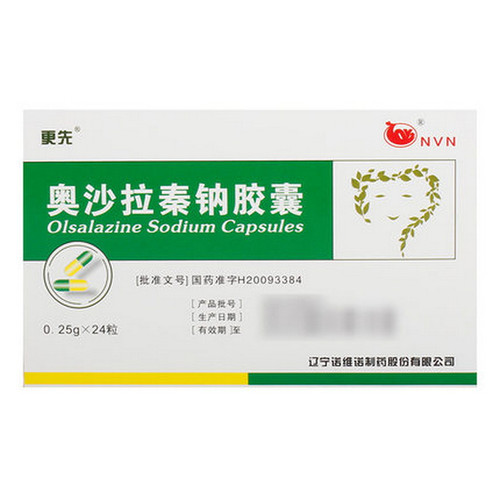Product Overview
[Drug Name]
Generic Name: Gentamicin Sulfate and Bismuth Carbonate Capsules
Trade Name: JingRui Gentamicin Sulfate and Bismuth Carbonate Capsules, 12 Capsules
Pinyin Code: JingRui LiuSuanQingDaMeiSuTanSuanZuoJiaoNang 12Li
[Main Ingredients]
This product is a compound preparation. Each capsule contains 40mg (40,000 units) of gentamicin sulfate and 600mg of bismuth subcarbonate.
[Properties]
This product is a capsule containing white or slightly yellowish powder or granules.
[Indications/Main Functions]
For chronic ulcerative enteritis, dysentery, and acute enteritis.
[Specifications]
12 capsules
[Dosage and Administration]
Oral. Adults: 2-3 capsules three times a day; children: 1 capsule three times a day. For continuous use, The course of treatment should not exceed 10 days.
[Adverse Reactions]
1. Rare gastrointestinal symptoms such as nausea, loss of appetite, vomiting, and abdominal distension, as well as rash and elevated serum aminotransferase levels, may occur. 2. Rarely, hearing loss, tinnitus, or a feeling of fullness in the ears (ototoxicity), hematuria, significantly decreased urination frequency or urine volume, loss of appetite, extreme thirst (nephrotoxicity), unsteady gait, dizziness (ototoxicity, vestibular effects), dyspnea, drowsiness, and extreme weakness (neuromuscular blockade) may occur. 3. Long-term use of high doses may cause constipation, alkalemia, and malabsorption syndrome.
[Contraindications]
This product is contraindicated in patients allergic to this or other aminoglycoside antibiotics.
[Drug Interactions]
1. Concomitant use or sequential administration with other aminoglycosides may increase the potential for ototoxicity, nephrotoxicity, and neuromuscular blockade. Concomitant use with neuromuscular blockers may aggravate neuromuscular blockade. 2. Concomitant use or sequential administration with capreomycin, cisplatin, ethacrynic acid, furosemide, or vancomycin may increase the potential for ototoxicity and nephrotoxicity. 3. Concomitant use with ceftriaxone may increase nephrotoxicity. 4. Concomitant use or sequential administration with polymyxins may increase nephrotoxicity and neuromuscular blockade. 5. Concomitant use or sequential administration with other nephrotoxic and ototoxic drugs should not be used with this product to avoid aggravating nephrotoxicity or ototoxicity. 6. High doses of antipseudomonas penicillins (carbenicillin, ticarcillin, mezlocillin, azlocillin, piperacillin) may inactivate gentamicin and should be used separately.
[Precautions]
1. Use with caution in patients with dehydration, 8th cranial nerve damage, myasthenia gravis or Parkinson's disease, or renal impairment. 2. Patients allergic to other aminoglycoside antibiotics such as streptomycin and amikacin may also be allergic to this product. 3. Bacteria resistant to other aminoglycoside antibiotics such as tobramycin and sisomicin are also likely to be resistant to this product. 4. Patients with chronic intestinal infections who take this product long-term or in high doses should be aware of the possibility of nephrotoxicity or ototoxicity. 5. Regular urinalysis, renal function tests, and hearing tests are recommended for long-term or high-dose use of this product. 6. Long-term use of this product may cause intestinal flora disturbance.
[Use in Children]
Due to the potential for ototoxicity and nephrotoxicity, this product should be used with caution in children.
[Use in Elderly Patients]
Due to the potential for ototoxicity and nephrotoxicity, this product should be used with caution in elderly patients.
[Pharmacology and Toxicology]
Gentamicin sulfate is an aminoglycoside with excellent antibacterial activity against various Gram-negative and Gram-positive bacteria, including various Enterobacteriaceae such as Escherichia coli, Klebsiella, Proteus, Salmonella, Shigella, Enterobacter, Serratia, and Pseudomonas aeruginosa. Neisseria and Haemophilus influenzae are moderately sensitive to this product. It is effective against Brucella, Yersinia pestis, Acinetobacter, It also has some effect against Campylobacter fetus. It has good antibacterial activity against approximately 80% of methicillin-susceptible strains of Staphylococcus (including Staphylococcus aureus and coagulase-negative staphylococci), but methicillin-resistant strains are mostly resistant to this drug. It has less activity against Streptococcus and Streptococcus pneumoniae, and enterococci are mostly resistant to this drug. When used in combination with beta-lactams, this drug often achieves a synergistic antibacterial effect. Its mechanism of action is binding to the 30S subunit of the bacterial ribosome, inhibiting bacterial protein synthesis. In recent years, the number of gentamicin-resistant Gram-negative bacteria has increased significantly. Bismuth subcarbonate has a protective, antacid and astringent effect on the gastrointestinal mucosa, achieving an antidiarrheal effect by reducing intestinal irritation and preventing excessive dehydration and imbalance in water and salt metabolism.








